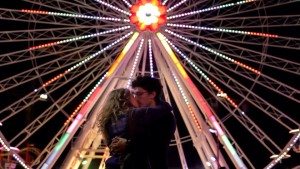The History of Now
Director: Nadiv Molcho
Cast: Nadiv Molcho, Aya Beldi
Running time: 93 minutes
Country: Austria, Morocco
We cannot truly control the people we love, because if we truly love them, we have to let them be themselves. To do so otherwise would make for an unhealthy relationship. The History of Now understands this process, showing us a bitter-sweet romance in which the expectation doesn’t quite match up with the reality, and a protagonist too narrow-minded to appreciate the difference.
It tells the story of aspiring writer Eli (Nadiv Molcho) and chef Maya (Aya Beldi) who meet in Vienna one day, and quietly fall in love. They spend days together lazing about, going to parties and art exhibitions, and planning the future together. In this sense they are a very normal well-educated couple with a certain amount of disposable income, and much of the films charm comes from the Linklater-like exultation of ordinary life. Everything seems to be going well, but on a trip to Morocco, where they meet another couple from Berlin, those small niggles in their relationship now expand to threaten their love.
The History of Now is another addition to the man-falls-in-and-out-of-love-yet-finally-through-that-experience-finally-understands-what-he-wants-to-do-with-his-life-or-finally-starts-actually-doing-it genre that can be also seen in films such as (500) Days Of Summer, or more recently/manipulatively Me and Earl and the Dying Girl. Thankfully, the film is not simply about the protagonists creative journey, but also gives ample screen-time to Maya on her own, mostly focusing on her passion for cooking. She has a certain zest for life which is quite magnetic, the best scene in the film being where she merely lists the things that she likes, seeming to re-appropriate them into a carefully curated yet also carefree approach to living.
The problem the film has is that we are not made to love her quite as much as he does, the sense of pathos at the end hardly matching the same as what he feels. Additionally, in certain narrative decisions his character can be seen to have the passive-aggressive moral high ground – something he can hardly feel entitled to. In that awkward displacement between me and the protagonist, I felt like I was watching a different movie to the one in his head.
In that awkward displacement between me and the protagonist, I felt like I was watching a different movie to the one in his head.
In the outlines, the film is fairly generic, yet it is in its specificities – such as a seemingly super chilled Berlin couple they meet in Morocco, and the argumentative dialogue (with particular references to Israeli customs) between the two leads – that the film finds its rhythm. However, I would argue that its at times too loose and improvisatory when it could have been more streamlined. This is also seen in the editing which belabours certain points – especially a break-up – to a point of exhaustion when the scene has already achieved peak effect. Nevertheless, it shows how romantic European cities such as Vienna are, the two characters making out at the bottom of the Wiener Riesenrad, famous cinematically for its appearances in The Third Man and Before Sunrise. (They don’t go on the wheel. Maybe it’s because they’re not tourists).
Coming out of an Erasmus year in Berlin I can definitely sympathise with this love for European-style, cross-cultural romance, and simply wandering around places and talking with someone you appreciate. I like this kind of personal film-making, and I also like wandering around European cities, yet the film ultimately lacks a sense of cosmic purpose to elevate the lessons learnt from this relationship into some kind of thesis statement on the nature of love. Instead it’s a simple love story without anything truly deeper to it, and its final resolution doesn’t quite work because instead of developing characters to a significant point, it just takes away their bad habits.
a simple love story without anything truly deeper to it …instead of developing characters to a significant point, it just takes away their bad habits
We get a sense that the film is saying that relationships never end, because we always carry the memory of the person we have dated within us, but this is only touched upon (mainly in the title) when it maybe could have been driven home instead. In a relationship you need a sense of balance, and a shared aim, otherwise it won’t work. The same isn’t entirely true for filmmaking – but a careful sense of proportion would’ve helped to elevate The History of Now into a much deeper film.


Comments